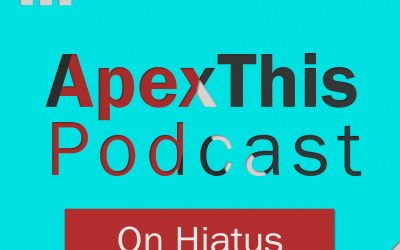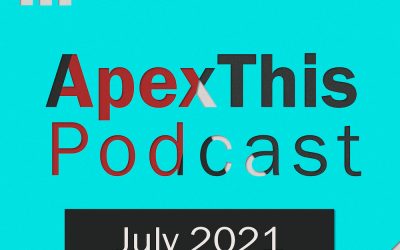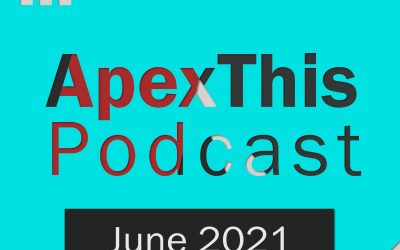Podcast: Play in new window | Download
Subscribe: Apple Podcasts | Google Podcasts | RSS
In This Episode
We talk about podcast formats and help you to define yours.
Links
Show Resources
Show Credits
This show is hosted, produced, & scored by Mark W.
TranSCRIPT
INTRO JINGLE (8sec)
Intro
Welcome to ApexThis.Podcast. In this episode, we talk about your podcast and show format. It’s taking your idea and adding structure to it, defining it. My hope is that after this episode, you will have a good idea on how to structure your show and maybe you’ll take a second listen of your favorite podcasts and see how they’re structured. Don’t worry, I’m learning along with you as I create a new podcast or rather, audiobook. I’m your host
I’m your host Mark, and coming up…The Format.
INTRO MUSIC
Defining a podcast format will depend on the type of podcast show you will have.
Now, you and I have talked about the first thing you need to have in order to start a podcast. Spoilers for those that missed that episode, it was a passionate topic.
You have your idea, you have your topic, now you need to know the show format.
Will it be a single host? Or will you have a co-host or regular guests? This can have an impact in your shows presentation.
Will the show be an ad-hoc presentation, outlined, or scripted?
What is your release schedule like? Weekly, Bi-Weekly, Monthly, or seasonal?
That may have been a lot to throw at you, so let’s go through each starting with hosts.
Hosts
This podcast is a single host podcast with directed instructional content. Do you have to identify yours at that level? Nope. I mention that as you can be a single host podcast that is focused on interviews, answering questions, or whatever. This can span to co-host formats as well.
You don’t have to follow a specific host format, mix it up. Your most important task is to simply provide great content. Make something that you would listen to. Whether that is solo, or with others.
The next setup is how the show will be done. First up Ad-Hoc.
Ad-Hoc
This is what it is. Nothing written, or prepared, you just talk. This can be tricky, as you are providing no direction or flow to your content. You are simply ad-libbing. This may make it difficult for listeners to follow along with you. But it can also make it interesting and keep your show unpredictable. If you move from a solo host format to dual or multiple hosts, then ad-hoc would benefit best for conversational type of podcasts such as those that talk about popular culture or movies.
With that said, you can combine this with the next method, outlining.
This is what I did for my first podcast. Despite writing a standalone blog post from the results of my research, I created an outline of the topics I wanted to discuss. I also added other segments into the show such as news and spots for ad placement so that I would know when and where in my outline they should occur for the show.
This provided structure to the show. I was able to simply speak into the microphone and hit each topic with no issue. I was able to create a conversational tone but get back on base when needed. To give an example, you could look at this episode. As an outline, I started with an intro, next are my talking points: hosts, outline, length and schedule followed by a wrap-up and outro. That takes us to the next option which is scripted.
Scripting
This is something I am experimenting with now. Even with this podcast series and the relaunch of my first podcast.
Scripting is writing everything you will say and do. You see this in things such as News reports, radio broadcasts, TV, and fictional podcasts. You can also work out the timing and other actions that may happen in your podcast episode.
People script episodes to be sure that everything is covered and to minimize errors. It also takes longer to produce due to the writing, line reading, and editing of the script before you even start to record. There is also the needed skill of being able to read the script verbatim, without sounding…scripted. So I have to ask. How scripted do I sound right now?
Length
Ok, so, I’ve read a lot of things regarding the schedule and timing of your podcast. Let’s start with time, or how long your podcast should be.
The short answer? It should be however long it needs to be.
What that means is, if the content is there, then your podcast will end when that content is complete. And if you have good content, if it is something that you would listen to, then you will find an audience and they won’t care about the length of the episodes.
Let me give you two examples: One podcast I love and was one I modeled my first podcast off of is Developer Tea by Jonathan Cutrell…
PLAY AN INTRO CLIP OF THE DEVELOPER TEA PODCAST
His podcasts are less than 20 minutes. Of course, there are some episodes that are longer as he takes on interviews. Overall, the short time frame allows him to concentrate on a specific topic in detail without a need to drag on. He shares the idea, supporting argument and conclusion.
Another example is Dan Carlin’s Hardcore History…
PLAY AN INTRO CLIP OF THE HARDCORE HISTORY PODCAST
This podcast dives deep into historical topics such as the Persian empire. These episodes are multi-hour wonders with his last published episode, at the time of this recording, is nearly 6 hours long. And people listen! Why? Because of his content, and his presentation…is amazing.
With this, we learn that the length of your episode should be appropriate for your content.
But wait – I have a podcast that I’m aiming to be 1hr long. How do I keep to that?
We are going to briefly jump back to scripted and outlined episodes as I want to reinforce what you can do with these.
We talked about how in either setup, you can define when and where segments begin and end and build out your show timeline. Maybe your intro is 30 seconds, and you want to talk about the news for 5 minutes. Your first segment or section of your show is regarding a particular topic and you’ve dedicated 30 minutes to it. You take a 1-minute break for an ad, and so on and so on.
If you are looking to keep a tight schedule, then at the very minimum, having an outline will give you a helping hand.
Schedule
Lastly, we have your release schedule. When and how often your show will release.
This entirely depends on the type of show you have. If you are focused on current events, you can do a daily show that focuses on top news stories of the day. You can also choose to release weekly covering highlights or even multiple times a week.
I think shows that revolve around that type of subject can have an audience that expects that type of turnaround or is OK with that type of release schedule be it, daily or weekly.
For others, such as this podcast, releasing every two weeks may be better…primarily for the host.
When you move out from a weekly podcast to bi-weekly or even monthly shows, it gives the host and show producers time to build, research and write content, or to provide more in-depth conversation regarding the content. And maybe it just works better for your schedule to produce and release a show every two weeks. It does for me.
The key will be to choose a schedule that you can commit to. This lets your listeners know when to expect it and they can build their routine around it.
Another option is to build episodic content or seasons.
You will mostly see this type of show format for story driven podcasts. This can be fictional podcasts, to investigative journalism podcasts.
This gives the hosts and their team, time to create the narrative, research, write, and produce the podcast. The seasonal format may also allow them time to build funding to be able to produce said episodes and the seasonal break allows the reset of the budget, new writing, recording, editing, and researching of new episodes while potentially providing higher quality.
Others may add breaks into their shows to allow them to build up a batch of content for release.
This type of release schedule benefits the hosts and listeners. Podcasts hosts and their production teams can do a deeper dive into topics and can increase their production values if they have a longer time in-between episodes or can take a break to create a batch of content. Listeners benefit from the more in-depth and well-researched material.
The downside is listeners forgetting about your podcast or losing interest due to the long wait in-between episodes. And as the host, you could end up procrastinating as you tell yourself “I have plenty of time to record that episode”.
Summary
All in all, you have options, and the great thing is, you can play around with them all to get what feels right for you.
So, what will it be? Are you a 1hr two host general talk podcast? No outline, you both just speak whatever is on your mind?
Or are you a 20-minute single host news podcast that releases daily?
You decide.
TRANSITION MUSIC (10 sec)
Closing
Thanks for listening to ApexThis podcast. I hope that you’ve enjoyed this episode and that I have made you think about your upcoming podcast. It is certainly on my mind as I outline my next project. Your homework, yes, there is homework, is to listen to your favorite podcasts and break down their formats. What do you like about them? Where are they similar? I also recommend to check out a news program as they include everything that we’ve talked about in this episode. They are scripted, time boxed for each segment, perform interviews, and investigative stories, all in a single show. Build a show format for that news program.
FADE IN OUTRO MUSIC
If you’ve enjoyed this episode, let me know. I’m on Twitter and Instagram at ApexThis. Subscribe on iTunes, Google Play Music, or on your favorite podcast app.
Also be sure to check out ApexThis.com for a sample of this episode outline and a template that you can use for yours.
My name is Mark and I’ll see ya on the next episode.
FADE OUT OUTRO MUSIC (30 sec)



0 Comments